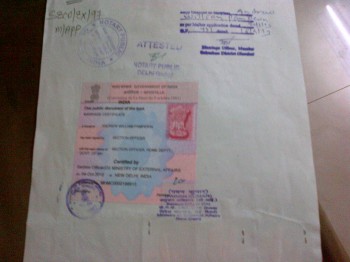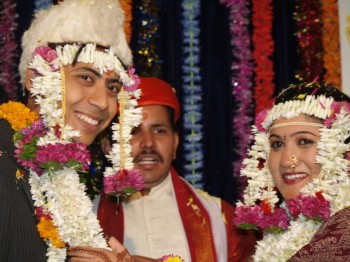11/02/2014
Guide to An Indian marrying a French in India
You are Indian and marrying a Frenchie?? Congratulations!!
And get ready for some fun with the administration! It is not too difficult but a bit time consuming, especially for the French thing.
Both French and Indian authorities ask for the couple a ‘one month reflection time’ (called “publication des bans” in French and “intent of marrying” in India). So start the process a little early ;)
First things first, you need to take an appointment with the consulate to check that you are a real couple and also give them some documents.
From the Indian spouse:
- Birth certificate issued within 3 month with the verification by the Home Ministry of the birth state and the apostille (this is THE difficult part we found)
- Passport
- Proof of residence
- Attestation of celibacy or “Affidavit” if it is not mentioned in the birth certificate. You can get this from an Indian Public Notary – we were not asked for it.
From the French spouse:
- Certificat de naissance de l’époux français
- Certificat d’inscription au consulat / carte consulaire de l’époux français
- Passeport (ou preuve d’identité)
- Justificatif de domicile
- Liste des documents signée
- Contact de la mairie de la localité française où les bans vont être publiés
- Facture d’électricité des parents (dans la localité française où les bans vont être publiés)
Then the consulate sends the papers to France and if all goes well, after a month or so they deliver an attestation of celibacy of the French spouse and you can go to the Indian court.
For the Indian marriage court you need:
- 2-3 “forms” that can be picked up at the court (Khar Telephonic Exchange if you live in Bandra/Khar)
- Passport of each spouse – notarised
- Resident permit of the French spouse – notarised
- Proof of residence of each spouse – notarised
- Identity pictures
- Attestation of celibacy of the French spouse given by the consulate – we were not asked for it.
Then they give you a date, at least one month later, and you have to come with 3 witnesses, carrying their passport, a copy and 3 identity pictures. They deliver a marriage certificate and if you pay you can get certified copies. It is strongly recommended to make a fuss and to not leave the place with at least 3 copies…
Once this is all done, you need to go to the consulate and give them:
- The original (they give it back afterwards) marriage certificate attested by Mantralaya, Mumbai (Home Department) and with the apostille – for all that you can use an agent that will charge 3,850 Rs and get everything done within a week
- Demande de transcription
- Attestation de filiation
We are still struggling to get the Birth Certificate but we got married in India and all that. We are just waiting for this last certificate to submit all the above mentioned papers to the consulate and finish it off!
And as a bonus, this is what the apostille looks like!
08:00 Posted in Expatriation (in India and in other countries) | Permalink | Comments (0) | Tags: india, indian, french, marriage, civil marriage, formalities, marriage court, certificates, apostille | ![]() Facebook | |
Facebook | |
04/26/2014
The Indian Wedding for Dummies - 7.In a nutshell
08:00 Posted in Incredible India!, Why in India... | Permalink | Comments (0) | Tags: india, marriage, wedding, arranged marriage, forced marriage, love marriage, rites, ceremonies, rituals, divorce, sheet, mehndi, henna, baraat, sex, incompatibility, contract, classifieds, matrimonials, matchmaker, nayan, astrologers, horoscope, marry a tree, marry a pot, auspicious, date, joint family, kama sutra | ![]() Facebook | |
Facebook | |
04/24/2014
The Indian Wedding for Dummies - 6. When things go wrong
The "Indian wedding" (I should say the Hindu wedding to be exact) has made the subject of numerous books, movies, visits to India. In short it’s an institution. I will try here to understand something to it!
With hardly 1 per cent of divorces, do Indians have the “keys” to successful marriages? Could it be arranged marriages?
To finish with the topic of marriage, the divorce! Yes yes!
Indeed, the figures are ridiculously low: 1.1% (source)
Firstly it is only since 1955 that divorce for Hindus is legal in India – which is 86 years after Christians, which was even 15 years before the legislation restored divorce in France in 1884! (In India, the divorce rules depend on the religion and there even was even a law, in 1969, specially for Indians who married a non-Indian.)
Secondly divorcing in India is not an easy task. (Hindu) spouses may divorce by mutual consent (for very specific reasons, such as adultery, cruelty, desertion for two years, religious conversion, mental disorder, venereal disease and leprosy) and only after living separated for one year. In addition, there is a mandatory six-month period of reflection after the case is filed. At the end of which the judge must estimate that the spouses have made all what was in their power to solve their problems (source).
Thirdly, one should not believe that all problems are solved once the divorce is granted: there is no regime of community property in India, everything returns to its owner (often the man).
And as for the pension, already quite low in general, the woman must prove the income of her husband and the tax authorities estimate that only 3% of the population declare their income! (source)
Quite a few women must regret, as some point of time, not having born in Kerala (in the Nairs, Ezhavas and Warriers communities) or in a tribe of Meghalaya: they are matrilineal societies where descent and inheritance is by women – in Meghalaya, it is the youngest daughter who inherits property and the burden of caring for her aging parents and unmarried siblings! (source 1; source 2)
Beyond (very frequent) violence and adultery, “incompatibility” is more and more frequently the cause of separation. And that generally refers to a not-getting-along with the in-laws or the spouses’ egos that seem to take more and more space as the West’s influence grows (source) and/or some sexual incompatibility.
I can almost only hear stories of marriages without sex around me (in India), and most often the man is the culprit, forcing my girl friends to do a lot of other activities to get rid of their frustration!
Already that sex with someone you love needs to be worked on, I can only imagine what it is like with someone you are not particularly attracted to... Especially when it's a taboo, so there is no way you can share it with your girl friends and get reassured, because somehow, women always tend to believe that everything is their fault... While sometimes it is not!
I am quite convinced that a lot of Indian men cheat on their wives (I could take the example of my ex-boss, my landlord, his father-in-law, my sales representatives) and who would they do it with if not with married women?? Well not so many single girls would allow it… It is like if there was a natural rebalancing of life: you get a sexless marriage but you can get sex outside without commitment and it is good for physical and mental health!!
A funny thing is that Westerners associate India with Kama Sutra and think of the country as a sex paradise! While in fact it is nothing like that. The Kama Sutra was written 1,500 years ago and since then the Muslims and then the British invaded the place and Indians became a little ass-tight on the subject... * The 10 most popular jobs in 2008 did not exist in 2004. Source: http://www.youtube.com/watch?v=x-9FaJPhFxQ
08:00 Posted in Incredible India!, Why in India... | Permalink | Comments (0) | Tags: india, marriage, wedding, arranged marriage, forced marriage, love marriage, rites, ceremonies, rituals, divorce, sheet, mehndi, henna, baraat, sex, incompatibility, contract, classifieds, matrimonials, matchmaker, nayan, astrologers, horoscope, marry a tree, marry a pot, auspicious, date, joint family, kama sutra | ![]() Facebook | |
Facebook | |
















